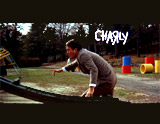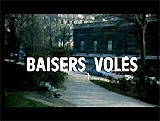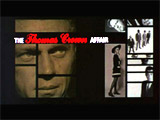
|
![]()
Greatest Films of the 1960s
1960 | 1961 | 1962 | 1963 | 1964 | 1965 | 1966 | 1967 | 1968 | 1969
Title Screen Film Genre(s), Title, Year, (Country), Length, Director, Description 




Barbarella (1968, Fr./It.), 98 minutes, D: Roger Vadim
Director Roger Vadim's psychedelic cult classic was an infamous, 'adult,' erotic science-fiction fantasy-comedy and suggestive sexual satire about the sexploits of a female space adventuress in the 41st Century. Based on the serialized French comic by Jean-Claude Forest in 1962 that was republished as standalone graphic novels beginning in 1964, it contained many sexual references and sexual innuendo. The satire made fun of the 'love and peace' era of the late 1960s, and also the early Bond-styled action-adventures of the time period. In the plot very appropriate for the mid-1960s, the sexually-liberated and emancipated title character Barbarella (Jane Fonda, director Vadim's recently-married wife) journeyed on a mission to a distant galaxy (Tau Ceti) with blind and winged angel Pygar (John Phillip Law) to save humanity from an evil scientist named Durand-Durand (Milo O'Shea) in the evil city of SoGo. The scientist-inventor possessed a laser-powered, positronic death ray - a doomsday weapon that might endanger the entire galaxy if an intergalactic war broke out between tribes. Barbarella often demonstrated her exceptional interstellar love-making to keep the peace, although she was confronted by wild feral children with killer dolls, pecking birds in a cage, a deadly and evil lesbian Black Queen (aka the Great Tyrant) (Anita Pallenberg) in SoGo, a lava-lamp substance known as Mathmos that was energized by evil deeds and thoughts, and a literal orgasmatron organ designed to provide fatal sexual pleasure, although Barbarella short-circuited the machine and caused it to explode. In the film's conclusion, the Black Queen fought back against Durand-Durand's attempted take-over by using her secret, apocalyptic "supreme weapon" - she released the life-sucking force of the Mathmos that consumed everyone in SoGo and the city itself; before being consumed by flames himself, Durand-Durand watched on his viewer as Barbarella (who was immune with her extremely pure and good nature) was saved, along with the Black Queen next to her. Pygar saved both the Black Queen and Barbarella by flying off with them grabbing on and clutching him on either side, to the safety of Barbarella's spaceship.



Bullitt (1968), 113 minutes, D: Peter Yates


Charly (1968), 103 minutes, D: Ralph Nelson

Faces (1968), 130 minutes, D: John Cassavetes



Flesh (1968) (aka Andy Warhol's Flesh), 90 minutes, D: Paul Morrissey
Writer/director Paul Morrissey was responsible for this avante-garde, low-budget experimental film from pop artist and producer Andy Warhol. Morrissey's solo-directorial debut feature film was this pioneering, small-scale indie film, shot in the early fall of 1968. The film-maker would go on to frequently collaborate with Andy Warhol on his many film projects (it was followed by Trash (1970) and Heat (1972)), although their films ran into severe censorship issues. This amateurish, compelling, improvised movie (with frequent, abrupt and jerky jump-cuts substituting for editing, and camera flashes) featured radical individuals on the outer fringes of society (hustlers, drag queens, trans-sexuals, studs, queers, lesbians, etc.). The bizarrely-fascinatin film provided a stark look at the decadent lifestyles of heroin drug-addicted and marginal, underground individuals in society. This self-indulgent and influential cult film was an explicit, X-rated, counter-cultural underground film with non-chalant, frequent male and female nudity, and mostly improvised and sexually-blunt authentic dialogue. However, there were no scenes of sexual intercourse, violence, drug-taking, exploitation, or serious perversion. It specifically objectified the ever-visible "flesh" of its main actor Dallesandro, plus it featured transvestite drag queens (i.e., Candy Darling and Jackie Curtis in their film debuts), an exotic stripper (sexploitation actress "super groupie" and stripper Geri Miller - before breast implants), and fellow hustlers and johns. The borderline, cinema verite home-movie was essentially a candid, ad-libbed chronicle of one day in the life of handsome bisexual hustler Joe (Joe Dallesandro) in New York City.


Funny Girl (1968), 151 minutes, D: William Wyler
Director William Wyler's highly-fictionalized musical biography was about the famed, early 20th century Ziegfeld Follies revue performer Fanny Brice, who was both a comedienne and film star. It was Wyler's first musical film - a Columbia Pictures adaptation of the Jule Style-Isobel Lennart-Bob Merrill stage musical that starred singer Barbra Streisand (reprising her 1964 Broadway role). The sequel Funny Lady (1975) provided more about Fanny Brice's life and also starred Barbra Streisand. In the film's opening, film star/comedian Fanny Brice (Best Actress-winning Barbra Streisand) entered the New Amsterdam Theatre, where theatrical producer Florenz Ziegfeld, Jr. (Walter Pidgeon) and his "Ziegfeld Follies" show was being featured. She entered the empty auditorium and sat in the third row, where she was informed that the show's producer Flo Ziegfeld was patiently waiting for her in his office. This line cued the film's major flashback to Fanny's youth and humble beginnings, beginning at her mother's Brice's Saloon. In the film's flashback, the aspiring and gifted rags-to-riches performer Fanny Brice was initially introduced as an unglamorous, gawky and uncoordinated Jewish girl from the Lower East Side of NY, putting her at a disadvantage with her competition. She was determined to convince others that she was going to be the next big star. She failed during a chorus audition in vaudeville, admitting that she had mistakenly tried out for a mismatching chorus role, although she was more "a singer and a comic." She was given a second chance to perform in a novelty act after falsely claiming that she could roller-skate. She humorously and clumsily participated in (and sabotaged) the stage number with other skating chorus girls; however, her act was interpreted as deliberate, comedic and hilarious. Backstage afterwards, she drew the attention of handsome, charismatic and seductive ladies' man suitor Nicky Arnstein (Omar Sharif), her future husband. Six months later, she received a personal telegram from Flo Ziegfeld himself to audition at the New Amsterdam, with Ziegfeld in the audience. She sang: "Second Hand Rose" for her audition song and was promptly hired as a Ziegfeld Girl. Feeling 'unbeautiful,' she challenged Ziegfeld about singing a second song "His Love Makes Me Beautiful" in the show, but accepted Ziegfeld's orders to avoid being rejected entirely. At her opening night performance in Ziegfeld's "Follies," she unexpectedly transformed the dramatic, lavish wedding-song finale song into a brilliant comedic performance by appearing on-stage as a pregnant bride ("in the family way") with a pillow stuffed under her wedding gown. The audience broke into laughter and Ziegfeld was outraged, but ultimately her decision to abruptly change the mood of the song with a comic twist brought her lasting attention and fame. The handsome Nick again appeared at Fanny's dressing room door, and offered her praises with a dozen yellow roses and a card, and accompanied her to her mother's block party at Brice's Saloon. To find privacy, they entered the alleyway where Fanny sang: "People" - a song of emotional longing. Afterwards, Nick mentioned that he wanted to get to know her more, but couldn't promise when he would see her again. In the meantime, Fanny became the show's biggest star. A little over a year since their previous visit, Nick met her on tour at the Baltimore train station and invited her to a private dinner at her hotel, the Majestic, to wine and dine her. He made direct advances toward her - the lights were lowered and they passionately kissed as they reclined back on a red chaise-lounger. Nick's next financial venture was to sail to Europe and gamble in poker games to win back money lost in his horse-racing business. After he vowed that things were different and that he loved her, she impulsively pursued him to the New York harbor (with the song "Don't Rain on My Parade"), boarded a tugboat, and caught up to his already departed ship. After an onboard winning streak that brought in a fortune, Nick proposed marriage. The couple moved into a huge, luxurious Long Island mansion in the country after millionaire Nick won the Epsom Derby, and began to raise a daughter. Fanny was rehired by the Ziegfeld Follies and was busily rehearsing for a new show, while Nick was often away from home, engaged in numerous failing business ventures. They had to resort to selling their home and moving into an apartment in the city. On Fanny's opening night of the new show, Nick was attempting to recoup his recurrent losses in an all-night poker game at a gambling casino, and failed to attend. Fanny became concerned about his gambling addiction and his continual uncaring and irresponsible behavior. To redeem and extract himself from his dire financial circumstances, the desperate Nick became tempted by another potentially-lucrative business venture - to engage in a shady bonds scam, but he initially refused. He was then offered to be a partner in the development of a second gambling casino on the East Side, but when he learned that Fanny had secretly invested $50,000 in the venture, he backed out. He became very uncomfortable about how he was becoming more and more dependent on her fame and fortune. Instead, Nick turned to the shady bonds deal that he had previously rejected, and was soon arrested and jailed for embezzlement. Against his lawyer's wishes, Nick pled guilty and received a 2 year-sentence (and would serve 18 months). He briefly spoke to Fanny and bluntly stated: "I want you to divorce me," but she convinced him to postpone his decision about their divorce until after he was released from jail. After their tearful goodbye, Fanny sang "Funny Girl" - his moniker for her. In the film's conclusion - an end to the flashback and a return to the opening scene, Fanny was still reminiscing about everything in the third row of the theatre, and awaiting Nick's arrival. Once Nick appeared, during their bittersweet reunion in her dressing room (like so many other times before), they realized that even though they loved each other, they also knew that they were only bringing each other unhappiness. Fanny admitted that Nick was "right" in asking for a divorce. The couple decided to part ways with the film's final lines: Nick: "Goodbye, Fanny" (long pause) Fanny: "Bye, Nick." The film's ending song was "My Man" - sung on-stage by Fanny before a black backdrop.



If... (1968, UK), 110 minutes, D: Lindsay Anderson



The Lion in Winter (1968, UK), 134 minutes, D: Anthony Harvey
Director Anthony Harvey's historical, dramatic tale of dysfunctional family intrigue was set in the court of British King Henry II (Peter O'Toole) in 1183. It was filmed using James Goldman's sharply written screenplay (adapted from his own play). The film shone with the performances and dialogue between the two leads: 36-year old O'Toole as the 50 year-old monarch, and 61 year-old Hepburn as his younger wife. As the film opened, it had been ten years since King Henry II had imprisoned his wife, Queen Eleanor of Aquitaine (Katharine Hepburn, who won her third of four acting Oscars). She was being punished for helping to precipitate a civil war against him. His three treacherous sons were also vying for the British throne, including the eldest: a legendary and fiery Prince Richard the Lionhearted (Anthony Hopkins in his film debut), the quiet but dangerous middle son Prince Geoffrey (John Castle), and the youngest - a manipulative and thieving scoundrel Prince John (Nigel Terry). The three sons and estranged wife Eleanor were summoned by Henry to the castle for a Christmas family reunion in Chinon, France. He had decided to name one of his three sons as his heir to the throne. Adding to the intrigue and plotting about who would be favored (Henry favored John, while Eleanor favored Richard), the teenaged but cunning monarch King Philip II of France (Timothy Dalton in his film debut) was also invited, with his older sister Princess Alais (Jane Merrow) - Henry's mistress.


Night of the Living Dead (1968), 90 minutes, D: George Romero
Director George Romero's ultra-low budget debut film became one of the most important and influential horror films of all time for its re-invention of the genre - it was shot in grainy black-and-white with an unknown cast, and was a simple yet brutally relentless plot of claustrophobic horror. The film was actually improved by its crude "drawbacks," since they lent a documentary feel and reality that made the film all the more horrific. The screenplay was taken from an unpublished short story Romero had written called Anubis, so-named after the Egyptian god of the dead. While initially considered drive-in schlock, the film gained in popularity and critical respect, and raised Romero to great heights as a horror filmmaker. He would go on to make a zombie trilogy with the successful Dawn of the Dead (1978) and the lesser Day of the Dead (1985) - and more afterwards. The images of the film were haunting, beginning in the opening scene in a remote and deserted W. Pennsylvania cemetery, where flighty female lead Barbra (Judith O'Dea) was bickering with and being teased by her brother Johnny (Russell Streiner in an uncredited role): "They're coming to get you, Barbra!" The two were suddenly attacked by one of the 'living dead' (one of many re-animated corpses), who had mysteriously risen from the grave for no known reason (though there were vague references and speculation about radiation emanating from a fallen Venus space probe that exploded in the Earth's atmosphere). A group of seven strangers were brought together as they took refuge from the shuffling, hungry, flesh-eating zombies in an isolated farmhouse. A capable, smart and sympathetic black man named Ben (Duane Jones) assumed leadership as the army of ravenous corpses repeatedly attempted to enter the house during a terrifying siege, amidst both unspoken racial and generational tensions between him and less capable, older white family man Harry Cooper (Karl Hardman), with his wife Helen (Marilyn Eastman) and daughter Karen (Kyra Schon). Two others were Tom (Keith Wayne) with his girlfriend Judy (Judith Ridley). Meanwhile, news and radio reports from the mass media emphasized the panic and threat. Attempts to escape failed as one-by-one, the members of the besieged group were picked off by the menacing ghouls who surrounded and then broke into the house. At one point in the film, after Harry was shot dead during a confrontation with Ben, the zombified young Karen consumed part of Harry's corpse, and then murdered her mother by repeated stabs with a cement trowel (often taken to be a social metaphor for the late 1960s youth of the nation rebelling against their elders). Sole surviving Ben was forced to shoot and kill both a reanimated Harry and Helen. In the dawn of a new day in the film's tragic ending, a lynch-mob posse of armed men led by bigoted Sheriff McClelland (George Kosana) approached the house - and tragically shot and killed Ben, and then threw his corpse on a fiery funeral pyre of burning zombie bodies.


Oliver! (1968, UK), 153 minutes, D: Carol Reed


Once Upon a Time in the West (1968, It./US) (aka C'era Una Volta Il West), 165 minutes, D: Sergio Leone
This was director Leone's true western epic masterpiece - a revisionistic revenge western filmed in John Ford's favored location, Monument Valley, and in Spain. It featured a great musical score (and harmonica melody) by Ennio Morricone, and told about the coming of the railroad and the struggle between various groups for monopolistic control - with numerous instances of homage to earlier traditional Hollywood westerns. And it also brought together all the themes, characterizations, and experimental visuals from his own previous three films - the successful "spaghetti western" trio of films from 1964 to 1966 starring Clint Eastwood as "The Man With No Name." Its widescreen opening sequence has been justly celebrated - a tense, detailed, almost-wordless standoff at noon in the midday sun between three hired gunmen (Snaky (Jack Elam), Stony (Woody Strode), and Knuckles (Al Mulock)) at a train station, marked by only exaggerated sound effects, wide closeups, and the arrival of the train with a harmonica-playing killer named "Harmonica" (Charles Bronson). The plot was about a beautiful widow, reformed ex-New Orleans prostitute Jill McBain (Claudia Cardinale), who arrived at her Sweetwater homestead in the desert - a key location where trains crossing the continent would have to stop for water. Just before her arrival, her new husband, local Irish businessman Brett McBain (Frank Wolff) and his three children had just been massacred (due to a railroad dispute) - it was a cold-blooded and merciless ambush and murder led by blue-eyed, black-hatted, railroad company employee Frank (American icon-actor Henry Fonda in an about-face role as a villainous, sadistic murderer). Frank was taking orders from sickly, crippled and corrupt railroad tycoon Morton, aka "Mr. Choo Choo" (Gabriele Ferzetti). The McBain murders were set up to blame honorable yet grizzled escaped con and half-breed, wily scoundrel Cheyenne (Jason Robards). Jill received help from the mysterious harmonica-playing stranger and protector/escaped con Cheyenne after the brutal killings, to thwart efforts of others to take her inherited strategic plot of land. The film concluded with a classic confrontational ending - a showdown duel between Harmonica and Frank, that revealed (in a fateful, revelatory flashback) the reason for Harmonica's life-long search for revenge against Frank. In the final sequence, a mortally-wounded Cheyenne (earlier he had been shot in the abdomen during Cheyenne's rescue) spoke his final words to Harmonica, who then rode away (with a second horse carrying the slumped-over corpse of Cheyenne). Meanwhile, Jill confidently strode to the Sweetwater railway station to offer water to the laborers and track-laying crews before the end credits began to roll.



Petulia (1968, UK), 105 minutes, D: Richard Lester



Planet of the Apes (1968), 112 minutes, D: Franklin Schaffner
Director Franklin Schaffner's thought-provoking, engaging and engrossing science-fiction film classic and action-thriller was a loose adaptation (by formerly blacklisted Michael Wilson and Rod Serling) of the Pierre Boulle novel La Planète Des Singes (Monkey Planet). This Vietnam War, Cold War and Civil Rights era film made many subtle points about race, animal rights, the establishment, class, xenophobia and discrimination. It was a pioneer in modern movie marketing, spawning not only four sequels and a 2001 remake and two reboots (and two television series spinoffs), but also action figures and other similar merchandising, foreshadowing later merchandising for Star Wars (1977) and the Indiana Jones series. In the film's opening, a US spacecraft (with four NASA astronauts) launched in 1972, after a long flight of 18 months, crash-landed into a lake (and sank) on a strange, Earth-like, desolate planet on November 25, 3978, over two millennia after take-off. The astronauts had traveled for centuries in cyrogenic suspension and had aged by only 20 months. Only three had survived the journey: Col. 'George' Taylor (Charlton Heston), Landon (Robert Gunner), and Dodge (Jeff Burton). [They didn't know that they had landed in an area later known as The Forbidden Zone.] Stranded American astronaut Taylor found himself with the other two astronauts and other primitive humans being pursued in a cornfield by horse-back riding, armed and uniformed gorillas. Taylor was shot in the throat (damaging his throat's voice-box), Dodge was killed (and later placed as a display in a museum), and Landon was knocked unconscious and captured (and later subjected to a lobotomy). Once taken as a prisoner, Taylor shockingly realized that the imprisoned and rounded-up caged humans were mute and inarticulate and could only grunt. He was paired up with a pretty captive, mute female primitive - soon after, he named her Nova (Linda Harrison). The ape society appeared to be dominated by English-speaking simians who lived in a multi-layered civilization. Humans (who possessed few rights) had been reduced to primitive, subservient mute slaves and were even hunted as animals. The three layers of society included gorillas (enforcers, hunters and laborers), orangutans (gov't leaders, lawyers and religious figures), and chimpanzees (scientists and doctors). At the bottom were humans, considered feral animals (for experimentation and slave labor). Taylor failed in his own attempt to escape when he found that he couldn't speak and explain himself to 'animal psychologist' Dr. Zira (Kim Hunter) (with her fiancee - archaeologist Dr. Cornelius (Roddy McDowall)) and malevolent, arrogant, government orangutan leader Dr. Zaius (Maurice Evans). Dr. Zira and Dr. Cornelius were intrigued that Taylor (now nicknamed "Bright Eyes" appeared to be a very intelligent, rational human who could speak (after his throat healed), read and write, and was possibly an evolved "missing link" - they intended to mate him with Nova. During Taylor's attempted escape in Ape City, he discovered a museum display or exhibit of a fellow astronaut - Dodge, now a stuffed and eyeless corpse. When he was finally caught in a net in the marketplace, Taylor delivered snarling and defiant insults toward the ruling apes when he feared he would be castrated or lobotomized. He spoke for the first time: ("Take your stinkin' paws off me, you damn dirty ape!"). He also cried out when restrained and sprayed with a high-powered hose: ("It's a madhouse!"). In a tribunal hearing in the National Ministry assembly hall to rule and decide on Taylor's fate, three orangutans assumed a "See No Evil, Hear No Evil, Speak No Evil" pose - imitating the wise monkeys of Japanese culture. Although Dr. Zira and Dr. Cornelius tried to defend Taylor, their theory that Taylor came from a civilization predating the apes that lived in the Forbidden Zone was denounced as heresy. As Taylor was aided in his rescue and flight from Ape City, by taking a journey to the Forbidden Zone where human artifacts had been dug up by Dr. Cornelius, Taylor offered an incredulous goodbye-kiss to sympathetic chimpanzee Dr. Zira. When confronted by gorilla soldiers in an ape militia led by Dr. Zaius, the chief-of-state orangutan confirmed that there had been a cover-up for the masses about an ancient human civilization - the truth was that savage, murderous, war-like Earth dwellers had destroyed the planet, and he was fearful of the humans' need to destroy each other. In the startling, twist-surprise ending, as Taylor left the group to explore further into the out-of-bounds Forbidden Zone with Nova, he rode down a beach on horseback when he suddenly stopped, dismounted, and stared upwards. As the camera panned toward Taylor, through a spiked object, he had two major reactions. He first exclaimed: "Oh, my God! I'm back, I'm home. All the time, it was...", but then he sank and dropped to his knees: "We finally really did it." He pounded his fist into the sand and railed against Earth's generations almost 2,000 years earlier that had destroyed his home planet's civilization with a devastating nuclear war - as Dr. Zaius had speculated - he uttered the film's final line of dialogue: "You maniacs! You blew it up! Ah, damn you! Goddamn you all to hell!" In a final shocking revelation, the full object came into view as the camera panned backward - it was the spiked crown of a battered Statue of Liberty that was buried waist-deep in beach sand, signifying that Taylor was still on Earth!
Pretty Poison (1968), 89 minutes, D: Noel Black

The Producers (1968), 88 minutes, D: Mel Brooks
Director Mel Brooks' debut film was a zany, often brilliant spoof comedy about Broadway productions and the Nazis that many considered in bad taste. Although certain elements are now tame and have lost some comedic shock value since the late 60s, the film was still daring, audacious and subversive. (The studio would never have released Brooks' film without the intervention of Peter Sellers, who convinced executive producer Joseph E. Levine to release it - the only compromise being a change from the original title Springtime For Hitler to The Producers.) In the high-energy, opening credits sequence, cash-hungry, desperate, bankrupt, wild-eyed, hustling has-been Broadway producer Max Bialystock (Zero Mostel) was entertaining and romancing rich, love-starved little old ladies for their money. Max's timid, meek, high-strung and neurotic accountant Leopold "Leo" Bloom (Gene Wilder in his first starring role) arrived, and Max delivered a "rhetorical conversation" about his failed professional life. He also devised a rascally scheme or plan, after an off-handed suggestion by Leo who was musing about using 'creative accounting' techniques. The two greedily paired up and concocted an illegal 'sure-fire' scheme to make millions from investors by producing the worst, most tasteless play ever made. They would purposely over-finance a "sure-fire flop" play, and then pocket the remainder of the investors' money after the show closed. Max fantasized that afterwards, they would run away with the stolen money to Rio de Janeiro, Brazil. They met up with with insane, goose-stepping, deranged ex-Nazi "kraut," WWII helmet-wearing Franz Liebkind (Kenneth Mars), a playwright who sang German anthems. He was the author of the play Springtime For Hitler - that Max wanted to produce on Broadway. They held extensive auditions for the chief role of Hitler and chose deranged, middle-aged, spaced-out, flower-child actor Lorenzo St. Du Bois "L.S.D." (Dick Shawn) to play the lead role. Their outrageous, perverted, outlandish and distasteful musical at the Playhouse Theatre premiered - with the opening, satirical title number Springtime for Hitler, complete with a goose-stepping, black-booted Nazi chorus (a parody of the Busby Berkeley style in a revolving swastika formation shot from overhead). [Note: The lighthearted satire of Hitler, reminiscent of Chaplin's The Great Dictator (1940), with such lyrics as "Don't be stupid, be a smarty -- come and join the Nazi Party!" was slightly scandalous.] Unexpectedly, their plan backfired - their resultant joy was turned to consternation when Leo and Max realized that their flop was actually a big surprise hit. After the trio conspired to blow up the theatre to end their production of Springtime For Hitler, they were charged with fraud and appeared in court. Leo presented a lengthy defense of Max to the court, but they were proclaimed "incredibly guilty." The trio was sent to the State Penitentiary after being sentenced for 2-5 years - but they hadn't learned their lesson. Leo and Max put on a similarly fraudulent production of Prisoners of Love in prison. Leo was accepting payments for 'shares' of the show from other convicts (and even from the warden).

Rachel, Rachel (1968), 101 minutes, D: Paul Newman



Romeo and Juliet (1968, UK/It.), 138 minutes, D: Franco Zeffirelli
Director Franco Zeffirelli's classic and immortal Shakespearean tale of forbidden, tragic, and star-crossed love was adapted into this modern and realistic version for the first time with two teenaged leads. It was shot in gorgeous Technicolor on location in Italy and enhanced by a memorable soundtrack from Nino Rota.The film's prologue (a voice-over by narrator Laurence Olivier, uncredited) - told about the ongoing, bloody feud between two important families in Renaissance Verona and the poignant premonition that "star-crossed lovers" - two youthful, innocent, strong-willed lovers [Romeo (Leonard Whiting) - son of the Montague family, and Juliet (Olivia Hussey) - daughter of the Capulet family] would be doomed by their tender romance and die by the tragedy's end, finally bringing about the reconciliation of the two bitter, warring families. An opening sword-fighting street brawl in the city of Verona occurred between representatives of the families of the Montagues and the Capulets - Tybalt (Michael York), Lady Capulet's fiery nephew (and Juliet's cousin) on one side, and Benvolio (Bruce Robinson), nephew to Montague on the other. The forbidden feud was broken up by the arrival of The Prince (Robert Stephens) on horseback with a fanfare of trumpets; he announced that the penalty for further fights and violations of the peace would be death. On the day of the Capulet's evening ball, Romeo and some of his friends were planning to crash the festivities wearing disguises. As they strolled along, Mercutio (John McEnery), a friend of the Prince's, delivered a fanciful, imaginative Queen Mab speech. At the ball, Romeo was immediately startled, entranced, and smitten by the lady Juliet. Romeo circled around the perimeter of the crowd during the song, took Juliet's hand from behind a pillar, and spoke his first words to her about his passion - she responded equally as they sensually pressed their hands together in the famous scene. They also dared to kiss each other - as they fell in love. In the secluded Capulet garden later that evening, Romeo saw Juliet upon her balcony in front of her illuminated windows - he began to utter his famous soliloquoy to her. They exchanged a series of loving vows, and made plans to marry. They were wed at the altar of the chapel the next day, arranged secretly by Romeo's confessor and father figure, Friar Laurence (Milo O'Shea), with the assistance of Juliet's bawdy Nurse (Pat Heywood). On the afternoon of his marriage, a violent altercation arose in the street between Tybalt and Romeo (with his best friend Mercutio), leading to Mercutio's accidental death; in retaliation, Romeo fought against Tybalt and killed him. The Prince banished the newly-wed Romeo from Verona, forever to be exiled and never to return. Before Romeo's flight from Verona to the nearby town of Mantua, the couple were briefly nude on their wedding night (the next morning) in Juliet's bedchamber. Afterwards, Juliet and Friar Laurence schemed to have Romeo and Juliet meet after a daring hoax. Juliet was to assent to an arranged marriage to Paris (Roberto Bisacco), but then the day before, she planned to swallow a potion that would make her appear in a death-like sleep for 42 hours. Then, following her burial in the Capulet family tomb, the plan was for her to escape with Romeo. Due to bad timing, and Romeo's servant Balthasar (Keith Skinner) bringing news to him that Juliet was dead (before Romeo was able to be alerted to the Friar's hoax by his courier), Romeo rushed back to Juliet's tomb and discovered his 'dead' Juliet. In a very dramatic scene, he swallowed poison, and kissed her hand before falling beside her. When Juliet awoke as planned, she saw Romeo's body on the floor and the poison vial in his hand. She picked up Romeo's dagger, stabbed herself in the chest, and inevitably joined her love in marriage-death. The final somber and climactic epilogue included the double funeral procession of the corpses of the two dead teens, who were carried up church steps to be laid in front of the Prince who chastised everyone and pronounced judgment on the two feuding families: ("All are punished!"). The epilogue's off-screen narration ended the film: ("A glooming peace this morning with it brings. The sun for sorrow will not show his head, For never was a story of more woe, Than this of Juliet and her Romeo").



Rosemary's Baby (1968), 136 minutes, D: Roman Polanski
Polish director Roman Polanski's first American feature film and his second, scary horror film came after Repulsion (1965, UK), another disturbing film in English, which was also about a mentally-unstable, sexually-terrified woman (Catherine Deneuve) who had been left alone in her apartment. The script for the very convincing, creepy, psychological, Satanist horror/thriller was adapted from Ira Levin's 1967 best-seller. It effectively made the point that evil surrounds us in the alienated, every-day, mundane city environment. The story told about a young pregnant wife who suspected and had strange premonitions about diabolical forces (a witches' coven) threatening her unborn baby, after she was sold out in a Faustian deal by her social-striving, aspiring actor-husband. A pair of newlyweds moved into a large, rambling, gothic apartment building in Central Park West (the Bramford): Guy Woodhouse (John Cassavetes), an unemployed, struggling actor, and his frail waifish wife Rosemary (22 year old Mia Farrow) with a fertile imagination. During dinner, their friend Edward "Hutch" Hutchins (Maurice Evans) explained some of the morbid and infamous history of their apartment building: "The Black Bramford." They met their overly-solicitous and intrusive elderly couple next-door neighbors: Roman (Sidney Blackmer) and creepy, nosy Minnie Castevet (Oscar-winning Ruth Gordon). Rosemary became "dizzy," woozy and disoriented after eating some tainted chocolate mousse (laced with sleeping powder) offered by Minnie. At the start of Rosemary's nightmare (reflecting her constant torment and guilt regarding her lapsed Catholicism), she wildly hallucinated. During her dreamy recollections while lying on the mattress, she was surrounded by many chanting, overweight, elderly naked figures (of the Satanists' coven), including Guy and the Castevets. During her nightmarish sleepy state, Guy began making love to her, but then his appearance changed into a grotesque Beast-like figure resembling the Devil, with yellowish eyes and clawed, scaly hands. She realized she was being 'raped' during a horrific ritualistic copulation scene, as everyone watched her having intercourse with the Beast, and she thought to herself: "This is no dream, this is really happening." The next morning, Rosemary questioned mysterious scratches she found on the side of her body, as Guy admitted making love to her while she was passed out. The paranoid, haunted, and hysterical Rosemary began to exhibit signs of experiencing a nervous breakdown and a belief in conspiracy theories. She thought she had been impregnated not by her husband but by Satan, so that her baby could be used in the New Yorkers' evil cult rituals, with coven members including Roman and Minnie. Coincidentally, Guy's acting career suddenly turned promising. In her apartment, Rosemary was told that her child was born dead by Dr. Sapirstein (Ralph Bellamy), who secretly was a member of the witch's coven. She was disbelieving and thought her baby had been kidnapped. In the concluding sequence of the supernatural horror fest, Rosemary snuck into the Castevets' apartment through the closet passageway - with a kitchen knife upraised in her hand - where she discovered a coven of witches (including Guy), surrounding a black-draped baby cradle-bassinet to pay their respects to her Satanic child - the devil's flesh-and-blood baby. After Rosemary took her first look and her eyes widened in terror and she became completely distraught: ("What have you done to its eyes?"), she then responded with nurturing and maternal comfort by caring for the baby and gently rocking Satan's spawn Adrian to sleep.


Stolen Kisses (1968, Fr.) (aka Baisers Volés), 90 minutes, D: François Truffaut


The Swimmer (1968), 94 minutes, D: Frank Perry
This was a strange arthouse sleeper film, much neglected and misunderstood when it was first released. The surreal allegorical film about a revelatory mid-life crisis-journey was based upon John Cheever's 1964 short story "The Swimmer." On a sunny summer afternoon, eccentric, middle-aged advertising executive Ned Merrill (Burt Lancaster) impulsively decided to return to his affluent home from a pool cocktail party by 'swimming' the distance of 8 miles. The fit, virile, self-satisfied and tanned Ned was obsessed with the idea of stopping at the homes and pools of friends and neighbors of his upper-class, hollow and soulless Connecticut community along the way, forming a virtual 'river' (dubbed Lucinda's River after his wife) that connected them. Each stop in his journey evoked powerful memories, and revealed more about the self-deluded man's past, distorted memories and disintegrating life - and his inability to face reality. Although nostalgic, he was forced to honestly confront where he was in life. Rather than living an ideal existence, he had become a shallow, dysfunctional and tortured suburbanite who had failed in his personal life. At the Graham's pool, he admitted to an indifferent Betty Graham (Kim Hunter) that he once had a secret love for her. Elderly Mrs. Hammar (Cornelia Otis Skinner) ordered him off her property. In another encounter with nubile 20-year-old ex-babysitter Julie Hooper (Janet Landgard) who joined him for part of his swim, he frightened her away when she revealed a schoolgirl crush on him and he became inappropriately amorous. Others included lonesome and hung-over Joan (Joan Rivers in her film debut), a pair of nudists, and stage actress and miffed ex-mistress Shirley Abbott (Janice Rule) who assaulted him with the truth of their relationship - she never loved him. He was met with hostility and criticized by others for his snobby wife and two out-of-control, estranged unloving daughters. During his last stop after being completely stripped of his protected ego, he arrived during a rainstorm (cold and shivering) at his own empty, locked, deserted and abandoned house - indicative of his recent financial troubles and the real truth about his unraveling broken-down life.
Targets (1968), 90 minutes, D: Peter Bogdanovich

The Thomas Crown Affair (1968), 102 minutes, D: Norman Jewison





2001: A Space Odyssey (1968, UK), 139 minutes, D: Stanley Kubrick
Director Stanley Kubrick's metaphoric, thought-provoking, grandiose, science-fiction landmark film was a visionary, visually dazzling, wide-screen masterpiece with mind-blowing special effects. It included the mysterious appearance of four enigmatic monoliths, multiple strange conjunctive orbital configurations, space travel to Jupiter, and the film's major protagonist - an omniscient super-computer, all presented in four episodes (three were named). The first monolith appeared to prehistoric ape-men, awakening them to the use of tools as killing weapons, for both warfare against rival creature competitors and for carnivorous hunting. Repeating orbital configurations and a further discovery of a monolith on the Moon and later floating in space somewhere near Jupiter, seemed to coax humankind to make evolutionary leaps and transcend bodily and technological limits. A team of robotic-like astronauts were on a nine-month, manned voyage on the spaceship Discovery One - a one half billion-mile journey to Jupiter from Earth (launching in the year 2002). The two functioning astronauts who were not in hibernation were Dr. Dave Bowman (Keir Dullea) and Dr. Frank Poole (Gary Lockwood). Their mission was to investigate the high-frequency radio signal directed from the monolith toward the planet of Jupiter. [Note: The signal from the ancient civilization that buried it on the Moon was to alert mankind that it was about to reach another more improved, advanced level of consciousness and intelligence.] The two crewmen were terrorized by the arrogant, humanistic, on-board computer HAL 9000 (voice of Douglas Rain). With the mission aborted due to the computer's malfunctioning and deactivation, and following a psychedelic light-show, Bowman was reborn within an embryonic divine life form that floated in space.



Yellow Submarine (1968, UK), 85 minutes, D: George Dunning